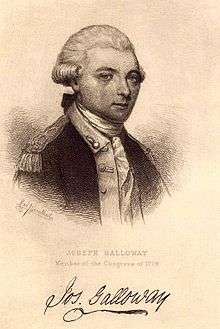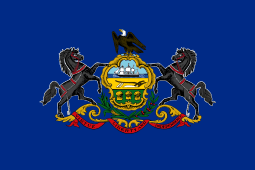Joseph Galloway
Joseph Galloway (1731—August 10, 1803) was an American politician. He became a Loyalist during the American Revolutionary War, after serving as delegate to the First Continental Congress from Pennsylvania. For much of his career in Pennsylvania politics, he was a close ally of Benjamin Franklin, and he became a leading figure in the colony. As a delegate to the Continental Congress, Galloway was a moderate, and he proposed a Plan of Union which would have averted a full break from Britain. When this was rejected, he moved increasingly towards Loyalism.
Joseph Galloway | |
|---|---|
 | |
| Continental Congressman 1774 | |
| Member of the Pennsylvania Provincial Assembly | |
| Assumed office 1776 | |
| Speaker of the Pennsylvania Provincial Assembly (1st term) | |
| In office 1766–1769 | |
| Preceded by | Joseph Fox |
| Succeeded by | Joseph Fox |
| Speaker of the Pennsylvania Provincial Assembly (2nd term) | |
| In office 1769–1774 | |
| Preceded by | Joseph Fox |
| Succeeded by | Edward Biddle |
| Personal details | |
| Born | 1731 West River, Maryland |
| Died | 10 August 1803 Watford, Hertfordshire, England |
| Spouse(s) | Grace Growden Galloway |
| Residence | Philadelphia, Pennsylvania |
| Profession | lawyer, politician |
After 1778, Galloway lived in Britain where he acted as a leader of the Loyalist movement and an advisor to the government. Many Loyalists went into exile after America won its independence from Britain and signed the Peace of Paris (1783), so Galloway permanently settled in Britain.
Early life
Galloway was born near West River, Anne Arundel County, Maryland, the son of a landowner in the Colony. He moved with his father to Pennsylvania in 1749 where he received a liberal schooling. He studied law, for a time alongside William Franklin the son of Benjamin Franklin and later a fellow Loyalist,[1] and he was admitted to the bar and began to practice law in Philadelphia.
Galloway married Grace Growdon on October 18, 1753, at Philadelphia. Some scholars speculate that he married her out of motives of financial ascension, due to her wealthy father, rather than for reasons of affection. Galloway converted to Anglicanism from Quakerism in order to marry Grace, and the conversion enhanced his political career.
Political career
Galloway was a member of the Pennsylvania Provincial Assembly from 1756 to 1774 and served as Speaker of the House from 1766 to 1774.[2] He was a prominent member of the faction which opposed Pennsylvania being a Proprietary Colony of the Penn family, and he called for it to be turned into a Crown Colony. Both Galloway and Franklin devoted a great deal of effort in lobbying London to bring the colony directly under the Crown's control. He was a British-American nationalist, believing that most Americans would prefer to remain loyal to the Crown if only they were given a legitimate and effective government that would inspire their loyalty.[3]
Galloway was a member of the Continental Congress in 1774, where he proposed a compromise plan for Union with Great Britain which would provide the colonies with their own parliament subject to the Crown. The Continental Congress rejected it by one vote. He signed the nonimportation agreement, while he was opposed to independence for the Thirteen colonies and remained loyal to the King.[2] He was a resident of Philadelphia and an associate of Benjamin Franklin with whom he corresponded over the issues of American independence.[4] In 1768 he was elected to the American Philosophical Society, which Franklin founded, and served as Vice-President of the organization from 1769-1776.[5]
Galloway urged reform of the imperial administration and was critical of the trade laws, the Stamp Act of 1765, and the Townshend Acts enacted in 1767, and he had a conciliatory plan to end the disputes between Britain and the colonies. He believed that the British had the right to tax and govern the colonies, keep the peace, and help the colonies to survive and flourish. Congress voted to expunge Galloway's plan from their journal, so he published it himself in 1775, reprimanding Congress for ignoring his analysis of Parliament's powers and colonial rights. He proposed a written constitution and joint legislature for the whole British Empire.[3]
American War of Independence
In 1775, the Assembly rejected Galloway's urging that it abandon its struggle for independence from Britain, so Galloway left the Assembly and the Congress.[6] In the winter of 1777, he joined British General Howe and accompanied him on his Philadelphia campaign. During the British occupation of Philadelphia, he was appointed Superintendent of Police and headed the civil government.[3] He aggressively organized the Loyalists in the city, but the British army was driven out of the city in 1778 following France's entry into the war. The British army retreated to New York, and he went with them.
Exile in Britain
In 1778, he fled to Britain with his daughter, never to return to the United States, and he became a leading spokesman of American Loyalists in London. The General Assembly of Pennsylvania convicted him of high treason and confiscated his estates, which included Trevose Manor, now known as Growdon Mansion, and much of the land that is now Bensalem Township, Pennsylvania.[2] In 1779, he appeared as a government witness in a parliamentary enquiry into the conduct of Lord Howe and General Howe during the Philadelphia Campaign, of which he was deeply critical.[7] When Galloway fled Philadelphia with the British, his wife Grace remained in the city with the hope of retaining the rights of their property. They expected that she would be able to join her daughter and husband afterwards, but Charles Willson Peale evicted her.[8]
Galloway was influential in convincing the British that a vast reservoir of Loyalist support could be tapped by aggressive leadership, thus setting up the British invasion of the South. After the war, he spent his remaining years in religious studies and writing.[2] He died a widower in Watford, Hertfordshire on August 10, 1803; his wife had died on February 6, 1782.
References
- Middlekauff p.87
- "Galloway, Joseph, (1731–1803)". Retrieved October 22, 2010.
- "Joseph Galloway (1731–1803), Pennsylvania Loyalist". Retrieved October 22, 2010.
- "Franklin-Galloway Papers". Retrieved October 22, 2010.
- Bell, Whitfield J., and Charles Greifenstein, Jr. Patriot-Improvers: Biographical Sketches of Members of the American Philosophical Society. 3 vols. Philadelphia: American Philosophical Society, 1997, 3:114–117.
- The Loyalist Mind: Joseph Galloway and the American Revolution, John E. Ferling, Editorial review. ISBN 0271005149.
- Syrett pp. 97–99
- Linda K. Kerber, Women of the Republic: Intellect and Ideology in Revolutionary America (Chapel Hill: University of North Carolina Press, 1980), p. 75
Bibliography
- Baldwin, Ernest H. "Joseph Galloway, the Loyalist Politician." Pennsylvania Magazine of History and Biography 26.2 (1902): 161-191. online
- Baxter, Beverley (January 1, 1978). "Grace Growden Galloway: Survival of a Loyalist, 1778–79". Frontiers: A Journal of Women Studies. 3 (1): 62–67. doi:10.2307/3345995. JSTOR 3345995.
- Boyd, J. P. Anglo-American union: Joseph Galloway's plans to preserve the British empire, 1774–1788 (1941).
- Ferling, John The Loyalist Mind: Joseph Galloway and the American Revolution. Pennsylvania State Univ Press, 1977; ISBN 0-271-00514-9.
- Ferling, John. "Compromise or Conflict: The Rejection of the Galloway Alternative to Rebellion." Pennsylvania History 43.1 (1976): 5-21. online
- Ferling, John E. "Joseph Galloway's Military Advice: A Loyalist's View of the Revolution." Pennsylvania Magazine of History and Biography 98.2 (1974): 171-188. online
- Middlekauff, Robert. Benjamin Franklin and His Enemies. University of California Press, 1998; ISBN 0-520-21378-5.
- Newcomb, Benjamin H. Franklin and Galloway: A Political Partnership. Yale U. Press, 1972.
- Norton, Mary Beth. "The Important Crisis upon Which Our Fate Depends." Liberty's Daughters: The Revolutionary Experience of American Women, 1750–1800. Cornell University Press, 1996; ISBN 0-8014-8347-6. 44–45.
- Tait, James. "Galloway, Joseph (c. 1731–1803)" Dictionary of National Biography (2004)
External links
| Wikimedia Commons has media related to Joseph Galloway. |
- Galloway’s Plan for Union at the University of Chicago website
- United States Congress. "Joseph Galloway (id: G000026)". Biographical Directory of the United States Congress.
